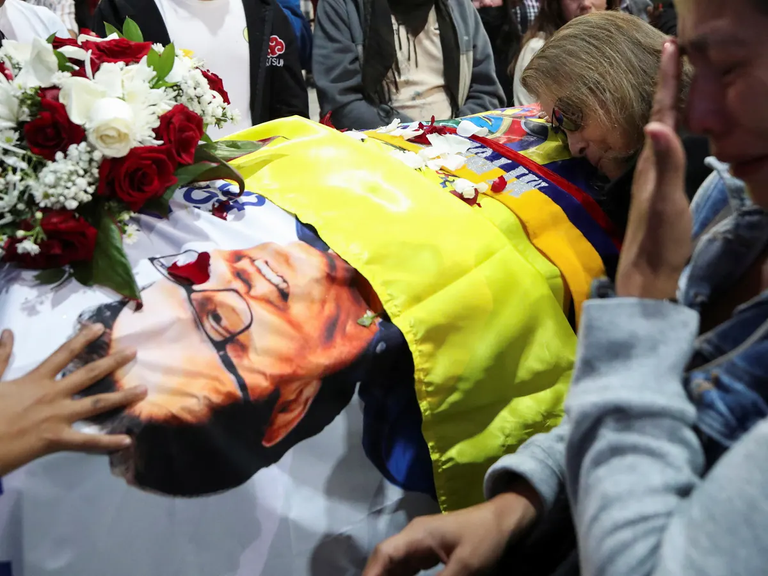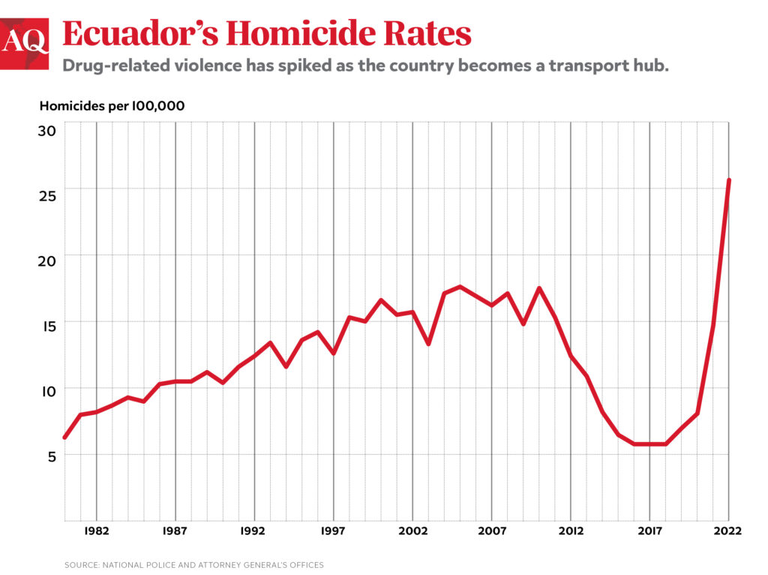
In a matter of years, Ecuador has gone from being one of Latin America's most peaceful countries to one of its most dangerous, with a homicide rate soaring from 5.84 per 100,000 people in 2018 to 26.1 per 100,000 people. Sandwiched between Colombia and Peru, Ecuador was considered an island of peace in the region, but this image has been shattered by frequent states of emergency, mass prison riots, assassinations and cartel and gang related violence. So in this article, we're going to explore what's been going on in Ecuador, explain how things got so bad, and consider the prospects for change under the newly elected president.
Now, this process has arguably been a long time in the making, but things most notably intensified about 3 or 4 years ago as gang related violence broke out into the country's overcrowded prisons. For instance in 2019, the leader of the Los Cubanos gang was killed in prison, and in December 2020 the leader of Los Janeiro's was murdered while out in public in the city of Mantua shortly after being released from prison. The latter's killing then sparked a violent power struggle and turf war among rival leaders and gangs, with hundreds of inmates being killed in clashes and massacres over the next year or so, and dozens of prison guards taken hostage during standoffs. One of the worst riots was in September 2021, in the literal penitentiary in Ecuador's largest city, during which more than 120 inmates were killed. In a sign of how out of control the prison system had become Ecuadorian authorities seized rifles, handguns and thousands of rounds of ammunition and even a grenade launcher after they retook control of a prison following a deadly riot in July of this year.

But violence hasn't even just been limited to within prison walls, as evidenced by the soaring homicide rate. The country's security situation has deteriorated significantly, and there's been a number of high profile assassinations. In February, a candidate for the mayor of Puerta Lopez was shot and killed. In July, the mayor of Mantua was shot and killed. And then in August, a presidential candidate was assassinated while leaving a campaign rally in the city of Quito. Then in late August, Quito was hit by two car bombs, they exploded outside the current and former offices of the Ecuadorian Prison Agency. But what actually happened to cause this descent into insecurity? Well, as ever, there are a multitude of factors that have aligned to create the current situation. Firstly, pre 2017, the Colombian guerrilla group far largely controlled the valuable cocaine trafficking route that went from Colombia into Ecuador and then out to the rest of the world via Ecuadorian ports and broadly violence in Ecuador was kept to a minimum. However, in 2017 having signed a landmark peace deal with the Colombian government a year earlier, fark disbanded. Now, this was obviously good news for Colombia, but it meant that a power vacuum had opened up and soon enough, Mexican cartels, Colombian dissidents and Ecuadorian groups were battling for control over the lucrative trafficking route, and even the Albanian mafia have reportedly established a presence within the country.
It also turns out that Ecuador has a lot of pull factors for unsavory groups. Its official currency is the US dollar. It has relatively good infrastructure and has pretty relaxed visa rules. It's also been argued that the intensification of violence and gang cartel activity in the last couple of years has come on the back of a backlog in drug trafficking caused by the Covid pandemic, which created somewhat of a surge in cocaine transiting through the country. Additionally, the actions of successive Ecuadorian governments over the past decade or so have helped to lay the groundwork for security to deteriorate and violence to soar. Under the presidency of Rafael Correa from 2007 to 2017, the homicide rate was actually brought down to a historic low attributed to his social spending, cutting of poverty and inequality, and interventionist policies that effectively let street gangs transition into cultural associations or urban youth groups. But it's been argued that at the same time he was sowing the seeds of insecurity. For instance, Correa in 2009 declined to extend the lease for a US military base in Manta, from which the US conducted anti-narcotics surveillance and operations in Ecuadorian waters and also cut ties with the US's International Narcotics Agency.

Correa also oversaw a more than doubling in the country's prison population, inadvertently creating a fertile ground for gangs as well as cartel recruitment and operation from behind bars. Correa's successor, Lenin Moreno under whom the homicide rate began to climb, further undermine the state's ability to maintain security by slashing budgets, including for prisons, as well as scrapping or downgrading industries including justice, interior and security. The Covid pandemic also hit Ecuador hard worsening economic hardship and further entrenching the position of gangs and cartels in society. By the time that Guillermo Lasso came to power in 2021, to quote Will Freeman from the Council on Foreign Relations, Ecuador was hurtling into the eye of the storm. Lasso's attempts to crack down on drug cartels failed to curb the rising violence, with measures like declaring cartel members as terrorists, allowing civilian use of handguns for self-defense, and further militarizing in the fight against crime. At the same time, a political crisis was distracting from the security one. In May of 2023, Lasso, facing an impeachment trial, opted to trigger the mutual death clause, triggering Congress to call an early legislative and presidential election in which he opted to not run for re-election, an election which eventually ended in November.
With a surprise victory for Daniel Naboa, a 35 year old, relatively inexperienced lawmaker who's also the heir to a banana empire founded by his father, who himself was a five time unsuccessful presidential hopeful and one of Ecuador's richest men. Daniel Naboa, during his campaign floated a number of ideas to tackle the security crisis, including militarising, ports and customs housing violent inmates in prison barges at sea, providing security forces with better weapons and equipment, and establishing a new intelligence unit. So what are the prospects of actually reversing Ecuador's sharp uptick in violence and restoring calm? Well, it's fair to say that the odds are stacked against him. Firstly, he's a newcomer, his political experience is limited to just two years in the National Assembly from 2021 to 2023, and to govern effectively as president. He'll need to work with said assembly, where his party only have a relatively small presence. Ecuador's financial situation also looks tricky. Slower growth, lower oil revenue, higher interest spending and a growing deficit set to reach 5% of GDP by the end of the year will all limit Noboa room for manoeuvre. Time is also against him having come to the presidency through a snap election Noboa will only serve for the remainder of Lasso's term, meaning that he only has until the end of May 2025 before he's up for re-election, which, considering the scale of the challenge ahead, is not much time at all.

And finally, any serious effort to solve Ecuador's crisis cannot be limited to just beefing up the security services and tackling the prison system. It must surely also involve tackling poverty, inequality and other social issues, as well as fighting entrenched corruption and the criminal capture of parts of the state. Which, it's fair to say, won't be an easy challenge.
Source of potential text plagiarism
Plagiarism is the copying & pasting of others' work without giving credit to the original author or artist. Plagiarized posts are considered fraud. Fraud is discouraged by the community.
Guide: Why and How People Abuse and Plagiarise
If you believe this comment is in error, please contact us in #appeals in Discord.